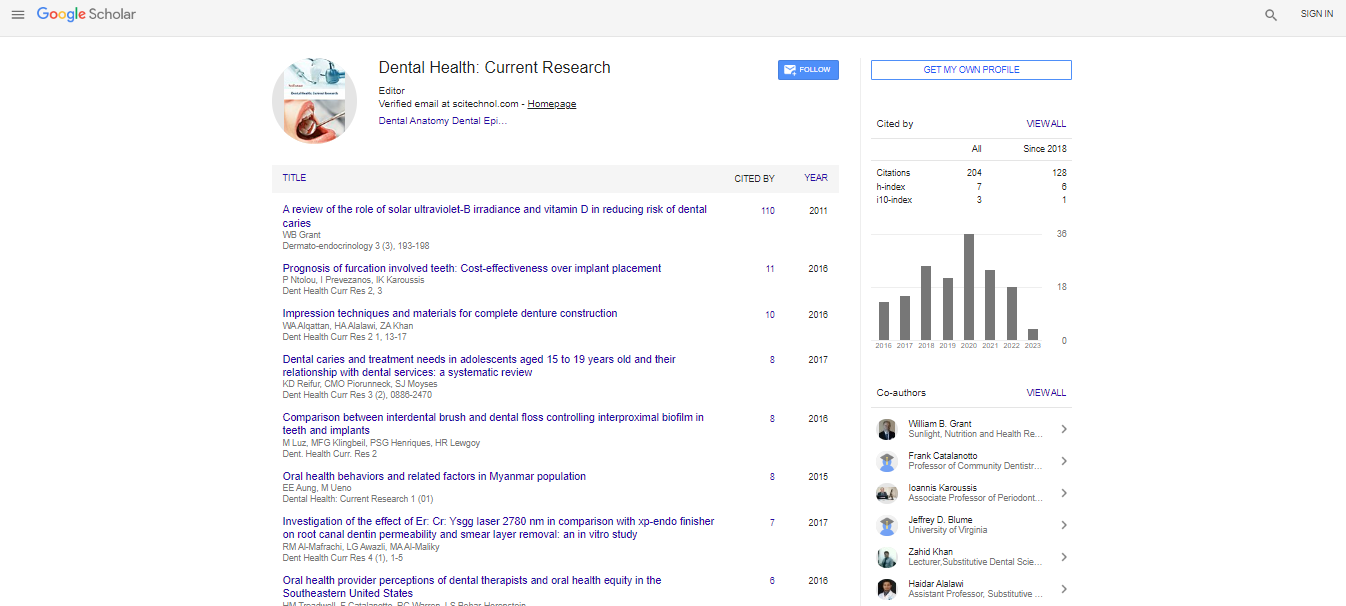Commentary, Dent Health Curr Res Vol: 10 Issue: 1
Revealing Systemic Health Through Oral Clues: Uncovering Symptoms of Disease in the Mouth
Nashtia Lorane*
1Department of Oral & Maxillofacial Pathology, Indiana University School of Dentistry, Indianapolis, USA
*Corresponding Author: Nashtia Lorane,
Department of Oral & Maxillofacial
Pathology, Indiana University School of Dentistry, Indianapolis, USA
E-mail: nashtial@gmail.com
Received date: 29 January, 2024, Manuscript No. DHCR-24-130292;
Editor assigned date: 31 January, 2024, PreQC No. DHCR-24-130292 (PQ);
Reviewed date: 14 February, 2024, QC No. DHCR-24-130292;
Revised date: 21 February, 2024, Manuscript No. DHCR-24-130292 (R);
Published date: 28 February, 2024 DOI: 10.4172/2470-0886.1000195.
Citation: Lorane N (2024) Revealing Systemic Health Through Oral Clues: Uncovering Symptoms of Disease in the Mouth. Dent Health Curr Res 10:1.
Description
The human body is a complex network of interconnected systems, each influencing the other in ways both profound and subtle. Among the various windows into our overall health, the mouth stands out as a particularly revealing indicator. Oral health is not just about teeth and gums; it can offer valuable clues to our systemic well-being. In this article, we explore how oral symptoms can serve as indicators of underlying systemic diseases, highlighting the importance of comprehensive dental examinations in safeguarding overall health. Traditionally, dentistry and medicine have been viewed as separate disciplines. However, research over the past few decades has increasingly highlighted the intricate relationship between oral health and systemic health. The mouth serves as a gateway to the body, and systemic diseases can manifest with oral symptoms due to shared biological pathways, inflammatory processes, and microbial interactions.
The oral-systemic connection
Individuals with uncontrolled diabetes may experience symptoms such as dry mouth (xerostomia), increased susceptibility to gum disease (periodontitis), and delayed wound healing, including oral ulcers. Studies have suggested a link between periodontal disease and an increased risk of cardiovascular events such as heart attack and stroke. Inflammation in the gums may contribute to inflammation in blood vessels, potentially exacerbating cardiovascular conditions. Conditions such as lupus, rheumatoid arthritis, and Sjögren's syndrome can present with oral manifestations such as oral ulcers, dry mouth, and changes in the oral mucosa. Deficiencies in essential nutrients such as vitamin C, vitamin B12, and iron can manifest with oral symptoms including bleeding gums, oral ulcers, and changes in the tongue's appearance. This condition characterized by decreased bone density can lead to bone loss in the jaw, resulting in tooth mobility, tooth loss, and changes in the fit of dentures. Oral manifestations such as oral candidiasis (thrush), oral ulcers, and persistent gum infections can be early indicators of HIV/AIDS infection.
The role of dental professionals
Dental professionals are uniquely positioned to detect and monitor oral manifestations of systemic diseases during routine dental examinations. By conducting thorough oral evaluations and taking into account a patient's medical history and presenting symptoms, dentists and dental hygienists can identify potential signs of underlying systemic conditions and refer patients for further evaluation and management. Recognizing the oral-systemic connection underscores the importance of interdisciplinary collaboration between dental and medical professionals. Dentists and physicians can work together to ensure comprehensive patient care, with dental professionals providing valuable insights into a patient's oral health status and its potential implications for systemic health.
Conclusion
The mouth serves as a sentinel for our overall health, offering valuable clues to the presence of systemic diseases. By understanding the oral manifestations of systemic conditions and the interconnected nature of oral and systemic health, we can appreciate the importance of comprehensive dental care in safeguarding overall well-being. Regular dental examinations, coupled with collaboration between dental and medical professionals, play a crucial role in early detection, prevention, and management of systemic diseases. Remember, good oral health isn't just about a bright smile-it's a reflection of your systemic health as well.
 Spanish
Spanish  Chinese
Chinese  Russian
Russian  German
German  French
French  Japanese
Japanese  Portuguese
Portuguese  Hindi
Hindi 